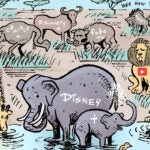Google is officially getting out of the managed services business in the United States, the company said earlier this month. The company shared the news at its Google Marketing Partners summit, an event that caters to agencies, consultants and other service providers.
Google has long offered managed services across Google Display & Video 360, Search Ads 360, Google Analytics 360 and Campaign Manager to bolster the ecosystem of brands, agencies, consultants and other service providers that use its products. This support would often be hands on keyboards programmatic talent that operated within the platform.
Google hasn’t announced a formal end date for the program and will likely wind down its internal support for brands in pace with each customer’s comfort level. As part of the transition, Google will facilitate conversations and even pitches with its marketing partners to take over services as it migrates clients off of its own teams.
While Google’s focus is building and selling technology, it has to drive spend through its platforms to make money. So it began offering services to help agencies and other providers get the most out of its stack.
“They could make more money if they had services people on their platform,” said Megan Pagliuca, chief data officer at Hearts & Science in ad AdExchanger Talks podcast.
But Google would prefer not to directly offer programmatic services, which are low-margin, intensive and risky, according to Oscar Garza, head of media activation at Essence.
“Things like overspend, fraud and brand safety can cause a lot of problems,” he said. “If you have clients who aren’t willing or don’t understand how to add technology to mitigate those things, it’s an uphill battle.”
Google has been trying to get out of the managed services game for some time for exactly those reasons. It’s cultivated hundreds of companies, some started by former Google executives, to resell and support marketing activity on its ubiquitous stack.
With programmatic in-housing on the rise, managed services are in high demand, which has allowed Google’s ecosystem of service providers to blossom – and some to see successful exits. MightyHive was acquired by Martin Sorrell’s S4 for $150 million last year, and Jellyfish was snapped up by French holding company Fimalac for a $640 million earlier this month.
That success has allowed Google to finally – and formally – hand off the baton to its partners.
“This has been a long build,” said Mario Schiappacasse, head of programmatic media at Jellyfish. “There’s finally a mature enough alternative. That’s why we’re seeing a more formal move in this direction.”
But many clients still rely on Google heavily for managed services. Garza estimates that 30% of agencies and brands today work with Google’s services teams. Some agencies even say they do programmatic and then outsource that work to Google for an added fee.
These agencies will either have to find another partner to rely on or be unable to deliver for their clients, which could lead to consolidation in the space.
“As with anything, planning effectively is worth its weight in gold,” Schiappacasse said. “The earlier you can get out in front of this, the better situated you are.”
Watchful eye
Despite a formal retreat, Google is still micromanaging how partners use its platform.
Google has always doled out certifications to designate which service providers are most adept at using its stack. At the top echelon are Premier Partners, which Google holds to strict criteria to deliver across a variety of services. Jellyfish, a premier partner, offers more than 40 services across Google technologies, for example.
Now Google is reorganizing these requirements into a “menu” of services that partners must prove they offer across marketing strategy, measurement strategy and organizational design and other broad areas. These services are mapped to a maturity model Google has developed in-house.
These are “really big, broad topics I didn’t expect that coming from Google,” Pagliuca said. “I think it’s definitely an overstep. I did find it surprising how far they’ve taken it.”
For agencies that have strong capabilities around data and programmatic, however, Google getting out of the services game is a good thing. Agencies often got into pricing wars with Google’s teams and had to justify their ability to work across multiple stacks for clients.
“For agencies it’s a good opportunity,” Garza said. “It continues to allow us to articulate the value of our services.”














